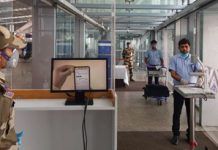The much awaited and talked about CCTV cameras for surveillance of Mumbai city were finally launched, keeping to the deadline, by chief minister Devendra Fadnavis at Hotel Taj Palace recently. After launching 1,381 cameras that have been made functional round the clock at key points in South Mumbai from Monday, Fadnavis emphasised on the need for digital intervention that will help increase efficiency and transparency in policing in Maharashtra. Fadnavis has promised to complete the Mumbai city surveillance project of installation of over 6,000 CCTVs before the 26/11 terror attacks anniversary next year.
“By the end of the project, we would have an integrated system where we would be equipped in face detection, number plate identification, data analysis system and much more through this network,” Fadnavis said. “CCTV network would boost crime prevention, early response, detection, prosecution and conviction. After all three phases of the project are completed, there will be 100% command and control system integration. It will enable us to evolve a comprehensive strategy to tackle crime.”
The chief minister further said that his government wants to ensure optimum use of manpower with technological intervention for effective policing. “At present, the effort worldwide is to create smart cities. Integral part of a smart city is that it should be safe. If a city is not safe, it can’t be called smart. Therefore, we can’t lag behind in policing.” Fadnavis also said that in today’s times it is impossible to tackle challenges regarding security measures without technological intervention.
He promised to install CCTV cameras in all important cities in the state to bring them under digital surveillance. “Pune is the first city to be under CCTV network. The digital surveillance in Nashik would be upgraded from the system used for the Nashik Kumbh. Steps are being taken to install CCTV network in Nagpur as well,” he added.
Chief secretary Swadheen Kshtriya, who was also present at the event, said the high-powered committee set up under the chief secretary in the past could not take a decision regarding the project despite given all powers by the government during the previous regime. “However, I am happy after I took over, we were able to take some decisions to ensure that the CCTV network sees light of the day,” he added.
Additional chief secretary (home) KP Bakshi also spoke at the event and highlighted that the department took the crucial decision to increase the number of cameras from 1,200 to 1,381 in the first phase by adding cameras in the sessions court area on Bombay High Court’s request. As per the project, the feed of all the 1,381 cameras would be monitored round the clock at Mumbai police headquarters and traffic police headquarters in Worli command centres.








